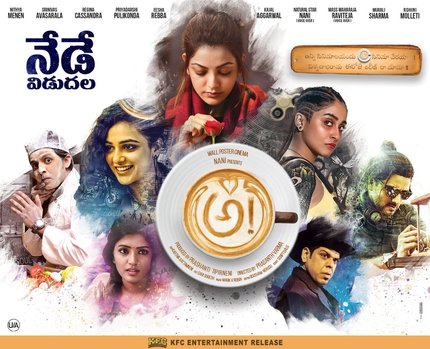Review: AWE Is A Bold, Kaleidoscopic Experiment That Entertains And Invigorates

For decades there has been little more to Telugu regional cinema than broad masala films. The idea of the masala film has deep roots in India, but most of the larger film industries in the country have taken great pains to distance themselves from the kind of overt tonal dissonance that characterized Indian cinema in the world's eyes.
North India's Bollywood films have hewn closer and closer to international standards, retaining the song and dance but often leaving out the physics defying action and melodrama for modern, upwardly mobile and internationally connected young audiences; while the Tamil and Malayalam language film industries have focused on hard hitting social dramas and high concept projects that often beg for international attention. But of the major industries in India, it's been Andhra Pradesh's massive Tollywood film business that has been the most reticent to move into the next phase, that is until very recently.
The world didn't know much, if anything at all, about Telugu langue cinema until 2012 when a little movie about star-crossed lovers called Eega made a big splash at international film festivals. That film featured a young actor named Nani in its opening moments as a fawning admirer to Samantha Prabhu's micro-artist. Since that film's runaway success, Nani has gone on to be a very successful and busy performer in Telugu films. He hasn't quite made the A-list yet, but he's always working and with this new film, Awe, he debuts as a producer in spectacular fashion.
The plot, such as it is, is labyrinthine at best, and completely indescribable at worst. Essentially, Awe is six stories being told simultaneously that fold into one another in the second half to create one grand conflict on which the conclusion is based. I know that's not much help, but this really is a film that needs to be experienced to be understood.
Director Prasanth Varma has taken fairly well worn tropes of western films and woven through them modern and contemporary concerns of Indian society in a way that is not only startlingly prescient, but also remarkably entertaining and - dare I say - fun. Awe is the kind of film that is not only difficult to describe for fear of spoiling too much, it's even tough to talk about because attempting to connect it to its influences would also spoil a lot of the fun and surprise of the film. However, what I can say with full certainty is that Awe is not only a crowd pleaser, but also a film that is unlike anything that mainstream Indian cinema has to offer.
The stories; that a young girl minding her mother's cafe, an adopted scientist looking to connect with his birth family, a junkie barista trying to make a life for herself, a chef guided by the audible thoughts of a fish and his bonsai tree friend, a budding woman introducing her parents to her lesbian lover, and a cocky magician demanding respect from an unseen adversary, and a suicidal woman having what appears to be her last meal are all told as if they were completely separate entities until the intermission at which point it becomes apparent that the film has a larger goal.
Awe is the kind of bold filmmaking that regional Indian films need to break from the international perception of the staid, stolid song and dance picture. Awe is none of that. It's not a hard hitting drama like last year's breakout hit Arjun Reddy - which I loved wholeheartedly - and it's not the massive financial success that was Baahubali 2, but it's somewhere in-between. A film that satisfies not only the commercial film fans who want to go to the cinema and have a good time, but also those who demand that cinema move forward and progress.
Leave it to the indie film stars to put their weight behind ambitious projects like this. In Tamil cinema it's been Siddharth who has risked his own money to produce solid experimental features like Jil Jung Juk and Aval, and I'm happy to know that Nani is willing to put his name - and talent (he voices the kind Ratatouille-esque fish) - behind this project. This is the kind of film that has the potential to put Indian regional cinema on the map. High concept filmmaking is always welcome in any language, and Prasanth Varma's film definitely fits the bill.






